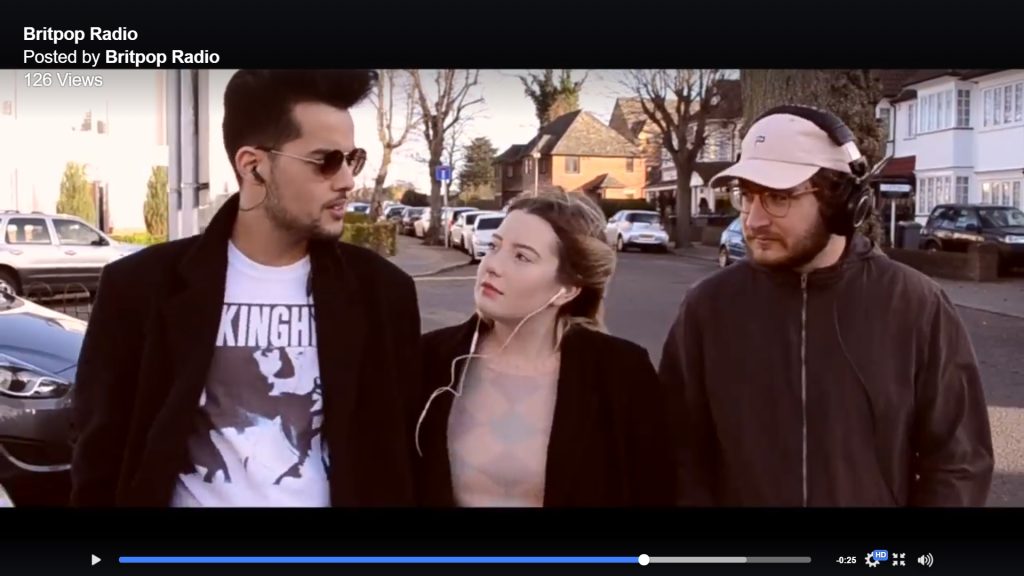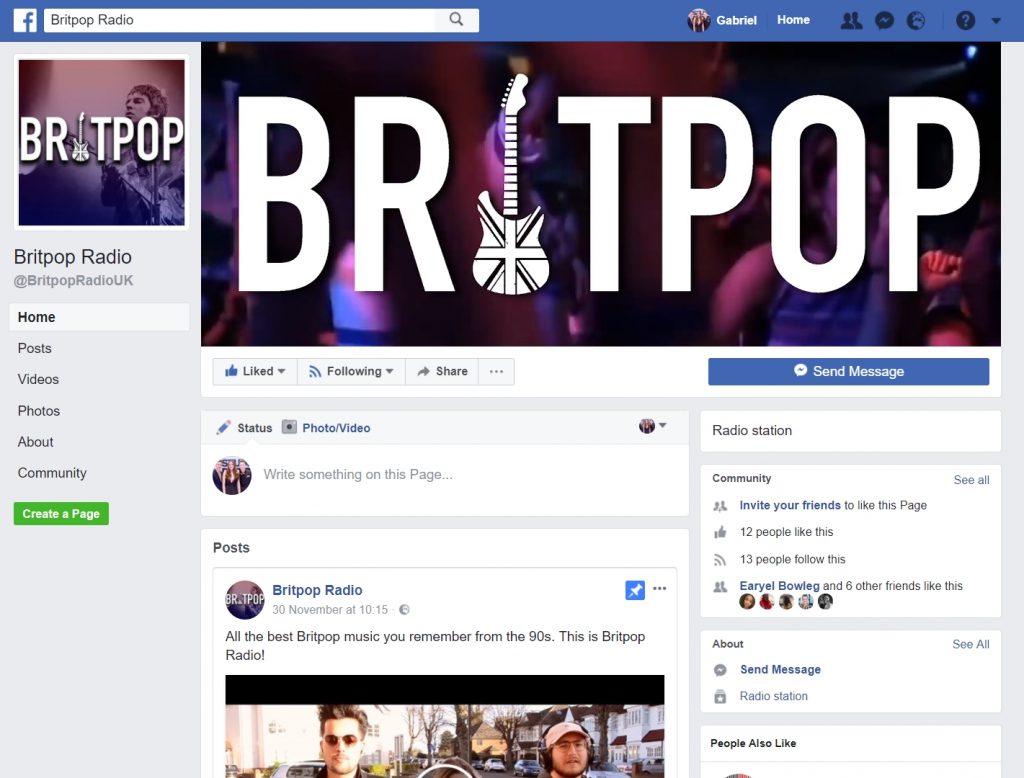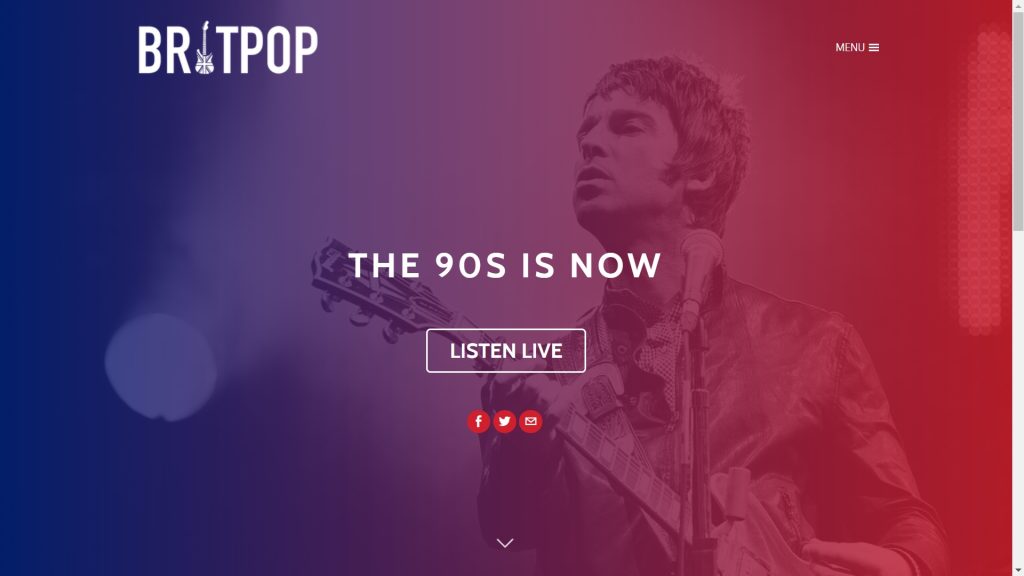Week 1:
In our initial meeting, our roles were decided and I put myself forward as Editor. My previous experience on the board of Directors in community radio, and as a member of the Smoke Radio committee gave me the confidence to take on this role. Management in radio is something I have a strong interest in, so I was excited to get to work.
I immediately started work making some of the first decisions for the station with the rest of the team.
Key decisions from the first meeting:
- The genre: It was decided that our station would play 90s music, specifically focussing on the subgenre of Britpop. We felt Britpop music has a clear aesthetic which would help to create a memorable station brand.
- Demographic: We felt a 22-45, primarily male demographic was appropriate for our station, as Britpop was at its prime in the mid-90s. We understood that the timeframe in which Britpop was most popular was a fairly small window, but decided not to make our demographic too small, as we felt Britpop music affected so much of music even after its heyday.
Based on our knowledge of other stations which include Britpop in their playlist, such as Radio X, we decided a primarily male audience would be appropriate (57% of Radio X’s listeners are male). - Station name: The station name “Britpop” was formally decided in the second meeting. We thought it was a strong title because it is simple, as it’s the name of our chosen genre, but also evokes Britishness, nostalgia and popular culture.
- Competitions/features: The idea of “Britpop Master” inspired by the Radio 2 “Pop Master” was widely commended, and I asked our Studio Producer to flesh-out this concept for discussion in our second meeting. I felt it was important for competitions/features on the station to aim to create a sense of nostalgia. In the second meeting, other feature ideas were mooted such as “Top 5 Guitar Solos” (which could also work for social media), and a 90s TV quiz.
- Advertisements: A number of brands were discussed which would be appropriate for our station demographic. These included clothing brands such as Converse, and drinks brands such as Redstripe. I pointed out that there may be broadcasting regulations in relation to advertising alcohol during daytime programming. I later looked up the Ofcom regulations on this, and the guidelines stated that we are allowed to advertise alcohol, as long as messages such as “Must be over 18” and “Please drink responsibly” were included, and the adverts do not show or encourage disorderly behaviour. The ads teams began working on scripts for advertisements, to be recorded and produced in future weeks.
- Live OB: We discussed what type of performance we would like for an outside broadcast – many options were mooted such as 90s cover bands, tribute bands and even contacting well-known bands in the hope they may be interested in appearing on the show. In the second meeting, a local band called “Give Me England” was mentioned which I have asked the OB Producer to secure with the help of the Head of Music.
- Presenting: I felt it was important for the two presenters to build chemistry, and therefore we’re holding practice sessions in the studio once a week.
- Interactive: I have put together an Interactive team to help our Head of Interactive on the day of broadcast. I have also offered to create a website for the radio station.
- Music: I asked the Head of Music to prepare an early playlist to be examined in the next meeting, as well as our music policy.
- Production workshops: We are holding weekly production workshops on a Thursday to create imaging, graphics, adverts and scripts.
I also produced a document containing the minutes of our meeting from week 1.
Week 2:
A Slack group was set up in the second week, allowing us to communicate in a professional manner. One very useful feature of the service is the ability to create polls, which made organising meetings and decision making outside of formal meetings easier. In this week, production workshops began every Thursday, in addition to our Monday meetings.
During the first production workshop, the majority of the production and marketing material was created: Rhys created our logo/social media channels, and myself and Josie created our imaging package.
Key events from week 2:
- Presenting: Joe and Riya had their first test programme, to build chemistry. It was clear more work needed to be done on this to make the balance of presenters right – many more test shows needed to be held to get the two presenters accustomed to each other’s presenting styles. I produced a “snoop” document containing advice about how they could improve their links and content.
- Ads: A draft advertisement was produced by Harriet Cope, advertising U2’s new music. There were a number of things that needed to be changed about this draft such as the voice, and choices of tracks in the montage. It was also decided that our News Presenter/Producer, Minnie, would assist Harriet and Denise to produce advertisements.
- Features: Guests began to be sourced for Britpop Master, and Rhys mentioned that an interview with Matt Pugh, who runs a Britpop night in Bristol could be secured.
- Outside Broadcast: It became clear that “Give Me England” may not be available for our live show, so other options were explored, including music students from the university. This is yet to be finalised.
- Music: A sample playlist was put together by the Head of Music. After a meeting with Matthew Linfoot, it became clear that we had to make our playlist less male-dominated, so work began to add more female Britpop artists into our playlist.
The meeting with Matthew made it clear we needed to focus more on our show brand as well as the station brand. In result, our music policy and brand needed to be repositioned slightly, so that the show itself focussed purely on Britpop that was 100% from the peak of the genre (’93-’97), whereas the rest of the station would play music from that time but also music inspired by that time. Therefore, we decided to call the show “Throwback Thursday”. - Clock/Running order: An early clock and running order was put together by the Studio Producer.
I once again produced a document outlining the minutes of our second meeting.
Week 3:
From the third week, it became clear that the production workshops were more productive than our Monday meetings, so our Monday meetings became a shorter production workshop in addition to our all-day production workshops on a Thursday.
I helped our Head of Interactive by creating a website for him to post content to. We purchased a professional domain name, and the site can be accessed at www.britpopradio.co.uk.
Key events from week 3:
- Music: Myself, the Head of Music, Studio Producer, and Presenter (Joe Pilbrow) began work adding tracks and imaging/production elements into Myriad.
- Run-through: We held an initial run-through of the programme on Thursday. From this, it became apparent to me that the slick commercial style of radio we were trying to produce worked best with only one presenter, so it was decided that Riya would work instead as a second Studio Producer alongside and covering for Jay, who had to take some time off due to personal reasons.
- Ads: The majority of advertisements were produced this week, with only tweaks to be made in the remaining two weeks.
- News: I asked Minnie to practice producing/reading news bulletins, which we were advised by Charles Carroll to pre-record 5-10 mins prior to broadcast, as is the norm on commercial radio. The news bed was also changed to give the news a more hard-hitting sound.
- Clock: The programme clock was finalised.
- OB: During week 3, our OB guests were secured. Westminster Music Student Hatice Tuzun (also known as TJ and Red Rum) agreed to perform on our pilot programme, which was published on our social media channels. For the final show, our OB Producer/Presenter Stuart secured alternative rock band “The Oi Ois”, who are heavily Britpop-inspired.
- Music: An altered playlist was presented to me by the Head of Music containing more female-led bands, and only music from ’93-’97 in the A, B and C list.
- Interactive: A promotional video was produced by Rhys, and I assisted during the shoot. (Click below to watch).

Week 4 – pilot week:
- Myself, the Head of Music, Presenter and Studio Producer added the new playlist into Myriad.
- Features/guests: I organised two temporary guests for the pilot of “Britpop Master”. They were two radio contacts from my social media, Hayley Wiltshire from Wired Radio, and Chris Steers from OMG Radio, both student stations. I briefed the guests, and suggested we didn’t focus on their radio backgrounds, as this is not very relatable to a wide audience.
A “Guess The Lyric” feature to win Noel Gallagher tickets was organised by Riya and produced by Rhys. - The pilot went ahead, after which many alterations were made. It was clear that more content and features needed to be produced, and the “Throwback Thursday” concept needed to be communicated more clearly.
Week 5 – final show:
We held a final production day on Wednesday which enabled us to sort all the finishing touches and finalise the changes made. This included a number of new features including a montage of female Britpop artists, 90s TV theme quiz, the interview with Matt Pugh was recorded. Our final guests for Britpop Master were secured: Rosie Bhullar (mother of Minnie), and David Hill, who I used to work with at Coast FM in Cornwall. It was suggested to us during the previous week that the callers should be older than in the pilot show, so both callers for the final show were chosen because they were older and lived through the 90s – David, in particular, was a good age as had just left school in the peak of Britpop.
It was mentioned previously that our presenter was not giving enough information about the music in the pilot, so more information for the presenter to read out on air was prepared.
The running order was finalised.
The final show on Thursday went by with very few hiccups, and I was very proud of what we all achieved. The programme was jam-packed with features and I think really celebrated 90s culture and the Britpop genre. The OB room (“The Crib”) looked fantastic decorated with 90s posters and lighting, the final video looked brilliant. At one point we did have an issue with profanity in one of the live band’s songs, but I made sure our presenter quickly apologised.
I think there was a dramatic improvement between our pilot show and the final programme, because we had so much more content prepared the second time around.
I think the programme had a strong concept and brand, and I enjoyed working with a great team. I learnt a number of leadership skills from this project, and how to deal with sometimes sensitive issues such as altering team roles, in a positive way.


